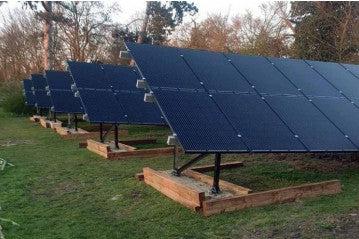
If you're considering installing a solar energy system for your home or business, you've probably heard of two main types of systems: on grid and off grid. In this post, we'll explore what off grid solar systems are, their advantages and disadvantages, and how they differ from on grid solar systems.
1. What Is an Off Grid Solar System?
An off grid solar system, also known as a standalone solar system, is a system that operates independently from the utility grid. These systems typically include solar panels, a charge controller, batteries, and an inverter.
The solar panels convert sunlight into electricity, which is then stored in the batteries. The inverter converts the stored DC electricity into AC electricity that can be used to power appliances and electronics.
2. Advantages of an Off Grid Solar System
One of the main advantages of an off grid solar system is that it provides energy independence. You're not reliant on the utility grid, so you don't have to worry about power outages or rising electricity costs.
Off grid solar systems are also environmentally friendly, as they use clean, renewable energy from the sun. Additionally, in remote areas where it's difficult or expensive to connect to the grid, off grid solar systems can be a cost-effective solution.
3. Disadvantages of an Off Grid Solar System
One of the biggest disadvantages of an off grid solar system is that it requires a significant upfront investment. You'll need to purchase and install all the necessary equipment, including batteries, which can be expensive.
Additionally, off grid solar systems may not be suitable for all homes or businesses, as they require a lot of planning and careful sizing to ensure that they meet your energy needs.
4. Difference Between On Grid Solar Systems and Off Grid Solar Systems
The main difference between on grid and off grid solar systems is that on grid systems are connected to the utility grid, while off grid systems operate independently. On grid systems typically don't require batteries, as any excess electricity generated by the solar panels is fed back into the grid for credit.
Off grid systems, on the other hand, require batteries to store excess electricity for use when the sun isn't shining. On grid systems are generally simpler and less expensive to install, but they don't provide energy independence or protection from power outages.
In conclusion, off grid solar systems offer many advantages, including energy independence and environmental sustainability. However, they require a significant upfront investment and careful planning. Before deciding on a solar energy system for your home or business, it's important to consider your energy needs, budget, and location.

0 comments